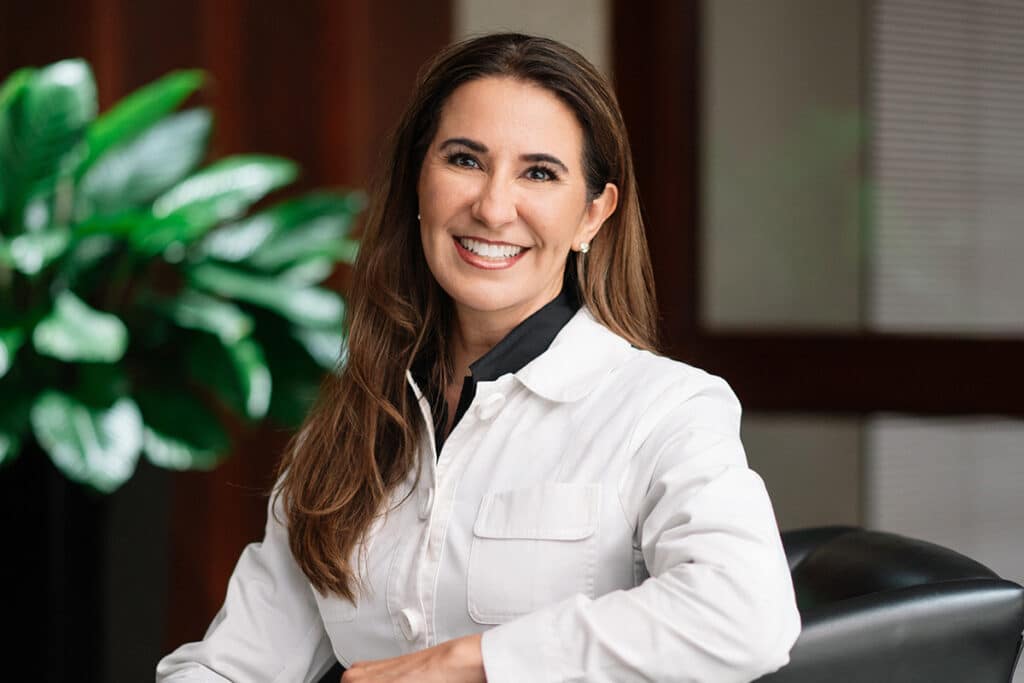It is no longer unusual for a woman to start her own business, but the three women we are profiling in this issue have done so in the fields of engineering and science, still largely dominated by men. Their companies are growing, they employ a highly educated work force, and they care about the economic development in the city. In the process, they may be changing the future image of San Antonio.
Elaine Mendoza
Conceptual MindWorks, Inc.
In her first speech as the newly elected chair of the Hispanic Chamber of Commerce, Elaine Mendoza told a little science fiction story.
She invited listeners to journey with her 75 years into the future to a changed San Antonio, where no one drops out of school, local school boards act as models for the nation, and employers flock to our shores to take advantage of our vibrant, well-educated work force. All of that happened because in 2004 business leaders focused their attention on improving education for San Antonio youngsters.
And that’s exactly what Mendoza intends to do during her tenure as chair of the Hispanic Chamber.
My focus is education, education, education, education! Economic development and work force development are one and the same, says Mendoza, the owner of Conceptual MindWorks, Inc., a high-tech business she founded in 1990. The company now employs 60 people, most with advanced degrees in scientific and engineering disciplines.
Mendoza knows firsthand the value of education. As a child, she watched both her parents improve their station in life through schooling. Her mother is now a school principal, and Dad has an engineering business of his own. Young Elaine showed interest in her father’s work at an early age. As a 9-year-old, she accompanied him to his university lab while he was working on his Ph.D. in materials engineering, and she liked to tinker with his old equipment in the garage. She eventually chose a technical field, too, earning a degree in aerospace engineering from Texas A&M.
It was also Dad who inspired her to strike out on her own at the tender age of 25.
My father had the guts to start his own company at about the time I graduated from college, she says. My fiancé (now her husband, Larry Gay) and I worked for him for a while. But I was lucky; my dad encouraged me to start my own company. Using technology to make a difference, that’s the dream we started with.
The new entrepreneur scraped together $1,000 to buy an old computer, and with Gay working elsewhere to support the family, she started looking for CMI’s first clients. Those came through the Small Business Innovative Research (SBIR) program sponsored by the Department of Defense. Set up to encourage small businesses to bid for specialized technical services to the military, the program is also intended as a springboard for the transfer of developed technologies into the private sector.
CMI started with software products that utilized artificial neural network technology to solve practical problems for the Air Force. It successfully developed a retinal model software that mimics what a pilot would see after suffering a laser injury to his eye. Lasers had been used to hurt actual pilots during Desert Storm, and the Air Force needed a simulated environment to use in the training of men who might be exposed to similar attacks in the future. Unfortunately, commercial possibilities for such a specialized product were limited.
It enabled us to develop our software competency, however, says Mendoza, so while our Air Force customers were growing us to do other kinds of technical support, we have also been building on that core competency all along, and two years ago we embarked on our own independent product development. That product is now in the private sector.
She is referring to Sevocity, an Internet-based charting software for physicians and small clinics that helps health practitioners store and manage patient records and financial information. Already in use by doctors in North Carolina, Montana and Georgia, as well as in Texas, Sevocity is constantly being fine-tuned to meet customers’ changing needs. Because it’s Internet-based, a physician can access his records from anywhere at any time. CMI also continues to provide technical support to the Air Force, both in information technology and unrelated areas such as biochemical defense and technical evaluation of human safety practices. In 1998, Hispanic Magazine ranked CMI as the 13th-fastest-growing Hispanic-owned business in the United States.
As an education advocate and the mother of two daughters, 9 and 6, Mendoza is especially interested in the relationship between girls and science. She served on a congressional commission that looked at this issue in 1999-2000.
Women want to do something that makes a difference, and they don’t see the connection between science and engineering and having a positive impact on the community. We need to change the message about that at an early age. Also, the (college) curriculum is often set up to be competitive. Girls prefer to work in teams. Then you have the stereotypes about computer geeks and mad scientists not very helpful role models, either.
Girls only need to look at Mendoza to see a very different role model. Good-looking and friendly, she often speaks to student groups and tries to open their eyes to the enormous potential of science and technology.I tell them how much fun science really is and how they can make a real difference, she says.
Nancy Kudla
dnovus RDI
Another gutsy woman who braved the nearly all-male world of information technology and military contracts is Nancy Kudla, CEO of dNovus RDI. Like Mendoza, she started modestly with $3,000 borrowed from her family and a desk in suite 203, which, she explains, stands for second floor, third bedroom in my house. Today, she employs 140 people, and her company’s headquarters occupies a comfortable 15,000 square foot suite of offices located just off 281.
More importantly, dNovus’ client list has changed dramatically. From the one-person consulting firm which made $36,000 its first year, the company has evolved into a $16 million operation that offers information technology services to the military, industrial clients and to all levels of government municipal, state and federal. In 2000, the U.S. Small Business Administration recognized dNovus as Small Business Prime Contractor of the Year. Various other entities, including the Greater San Antonio Chamber of Commerce, have also bestowed honors on both the business and its CEO.
For those who know the woman behind the success, none of this comes as a surprise. Kudla had already proven her mettle years earlier. Originally from Washington, D.C., she was accepted into the U.S. Air Force Academy (USAFA) the first time that august institution allowed females to enroll. Neither basic training nor the demanding coursework intimidated her. Of the 150 girls who had entered the academy with her, 60 dropped out, but not Kudla.
It was a tough way to get an education, but it was also tremendous leadership training. That period taught me a lot about myself, says Kudla, now a mother of four boys. I learned how to stay tough through hard times, how to get through tough situations because you simply have to, how to work with a team and how to recognize my limits. These are skills for life. Small business presents you with a lot of tough times. My training helps me believe in myself when I start wavering.
It was also at USAFA that she got a good dose of engineering education despite the fact that she was majoring in economics and international affairs. The Air Force is so technologically sophisticated that it wants all its officers to be technically competent. After graduation, she received additional training in computer science and worked as an AF computer systems analyst for five years.
But she could already see new challenges ahead. In 1985, Captain Kudla left the military to work in the private sector here and in Virginia, before she and her husband, Frank Kudla, decided to settle in San Antonio for good. Frank is now the chief financial officer for dNovus.
We are partners, says the CEO, referring to her husband. It’s wonderful to have a trusted partner to be your CFO.
Currently, dNovus is a subcontractor on a major project for the City of San Antonio which will, when completed, integrate under one system most of the city’s management functions. Another project involves continuous IT support for the automation of the Department of Defense’s forensic toxicology labs.
As CEO, Kudla faces many of the same challenges other executives deal with, but there is a difference. In essence, her company sells knowledge, rather than tangibles. Its products are new solutions to complex operational problems rather than routine services.
The unique thing about an IT business is that your inventory is literally the people you employ, she says. We have to pay attention to the people we hire and how we work with these vital resources. The better we figure how to leverage their talents and inspire them, the better our work will be.
This brought us to a discussion of recruitment possibilities in San Antonio and the San Antonio Technology Accelerator Initiative, known as SATAI. Founded a couple of years ago by a variety of stakeholders, the SATAI network has a goal to create a better climate for high-tech companies in the city.
It has made great strides in getting investors to look at San Antonio and inspiring collaborations between different entities. But it’s going to need city support for a while, says Kudla emphatically. We have great assets in San Antonio in security technology, biotech and to a lesser extent in IT. Continuous funding by the city is crucial at this point.
Mary Pat Moyer, P.H.D.
Incell Corp. and Teksa
One of the founders of SATAI, microbiologist Mary Pat Moyer, Ph.D., would certainly agree. Besides being a brave soul who left her tenured faculty position at the University of Texas Health Science Center (UTHSC) to launch a small bio- tech enterprise, Moyer is a passionate technology transfer advocate and believer in San Antonio’s potential.
I’ve lived here for 33 years and love it, but I don’t like the whining, she says, referring to a certain lack of will among San Antonio leaders to change the business image and reality of the city. San Antonio should become the biotech manufacturing center in the region. This field has a huge component of white-collar workers and high-paying jobs.
She co-founded SATAI to help build a critical mass of high-tech/biotech companies in town, which, in turn, would bring recognition to our area and provide jobs for our kids. She is now working with the San Antonio-Austin Life Sciences Association to position both communities to grow as a region.
An unconventional woman who married four times, followed a zigzagging educational path and talked her way into a faculty position in the surgery department, Moyer has always followed her own muse.
I’ve worked since I was 14, says the dynamic scientist. I’ve always supported myself and often had two jobs at the same time. Now I have two companies. It seems I always have two of everything. There’s so much to do in life.
With a Ph.D. from UT Austin in hand, Moyer convinced the medical school’s surgery chairman that she could set up a research program in cell biology and immunology to support the department’s work in transplantation, wound healing and cancer therapy.
I was hired at first as a non-tenure-track faculty member with wages only slightly higher than a post-doc’s, she says, but I became a full tenured professor only nine years after I started.
She also became the first female faculty member in the department and eventually co-founded the UTHSC women faculty association to support female colleagues. Moyer is the author of 200 scientific papers and abstracts and has served as a consultant to national and international bodies including the National Institutes of Health, NASA and the World Health Organization. Her scientific, business and community awards are too numerous to list here. All of this from a woman who was told by a chemistry professor that she should be home with her husband, making babies.
Which she eventually did as well. Besides her own two children who are now young adults, she has helped raise five stepchildren from two different husbands. Yet she never stopped pursuing her research goals and ultimately the implementation of that research in a business setting. She is married to C.P.A. Jim Janowiak, who works with her as vice president of finance and administration.
In 1993, Moyer created Incell Corp., which specializes in products and research services for biotechnology applications. Besides making specialized bioactive media for human cell growth and a variety of other reagents for the pharmaceutical industry, Incell has made a name for itself by developing a new, safer oral smallpox vaccine for the Air Force. The potential market, however, goes well beyond the Air Force, and Incell has just expanded to accommodate its new manufacturing role.
It was a huge gamble, says Moyer of the project that started in January 2002. We had to transition from a research company to a vaccine manufacturer, but I am so excited about it. That’s what I had wanted to happen all along. It took us 10 years! I want to bring reasonably priced medicines to people.
Incell also produces an omega-3 nutritional supplement that is used to strengthen the immune system of people undergoing chemotherapy. The product is now being tested in clinical trials at Johns Hopkins University.
Busy as she is, Moyer often hears the classic question: How do you find balance in your life? She doesn’t. Balance is a myth, she tells questioners. There are times when you have to focus on a project and forget about balance. Maybe I had to put up with the ugly wallpaper a little longer because I wanted to develop the smallpox vaccine, she says. Fortunately, her husband is often willing to write the birthday cards or do the grocery shopping to make life run smoothly.
In keeping with her philosophy of encouraging entrepreneurial initiatives in the city, Moyer has also incorporated a second company, Teksa, as a subsidiary of Incell to assist start-up high-tech businesses.
It’s like making soup, she explains. Incell is the meat. As it partners with other companies, one company will bring a potato for the soup, another a scallion it all helps the soup. These are small businesses living in people’s garages. Our incubator concept is about nurturing them so they can reach self-sustaining growth. The convergence of these technologies will have an impact on the future.
Author: Jasmina Wellinghoff
Photographer: Liz Garza Williams




